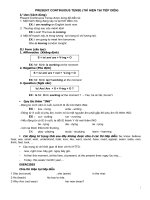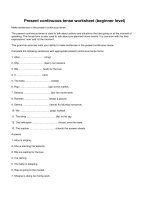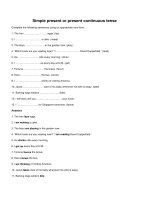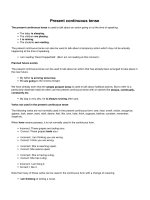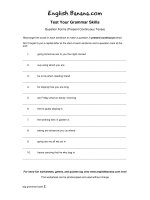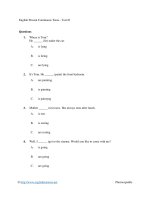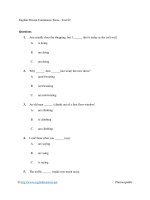Present continuous tense
Bạn đang xem bản rút gọn của tài liệu. Xem và tải ngay bản đầy đủ của tài liệu tại đây (16.46 KB, 2 trang )
Present continuous tense
The present continuous tense
is used to talk about an action going on at the time of speaking.
The baby
is sleeping.
The children
are playing.
It
is raining.
The students
are reading.
The present continuous tense can also be used to talk about a temporary action which may not be actually
happening at the time of speaking.
I am reading ‘David Copperfield’. (But I am not reading at this moment.)
Planned future events
The present continuous tense can be used to talk about an action that has already been arranged to take place in
the near future.
My father
is arriving tomorrow.
We
are going
to the cinema tonight.
We have already seen that the
simple present tense
is used to talk about habitual actions. But to refer to a
particularly obstinate habit we often use the present continuous tense with an adverb like
always, continually,
constantly etc.
My dog is very silly; he
is always running
after cars.
Verbs not used in the present continuous tense
The following verbs are not normally used in the present continuous form: see, hear, smell, notice, recognize,
appear, look, seem, want, wish, desire, feel, like, love, hate, think, suppose, believe, consider, remember,
forget etc.
When
have
means possess, it is not normally used in the continuous form.
Incorrect: These grapes are tasting sour.
Correct: These grapes
taste
sour.
Incorrect: I am thinking you are wrong.
Correct: I think you are wrong.
Incorrect: She is seeming upset.
Correct: She seems upset.
Incorrect: She is having a dog.
Correct: She has a dog.
Incorrect: I am liking it.
Correct: I like it.
Note that many of these verbs can be used in the continuous form with a change of meaning.
I
am thinking
of writing a novel.
She
is tasting
the soup to see if it needs more salt.
They
are having
lunch.
Be first to know when grammar rules change! Sign up to our newsletter here: englishgrammar.org (It's free)
Powered by TCPDF (www.tcpdf.org)
